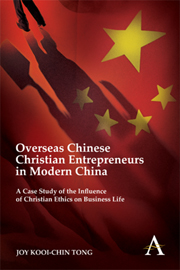 Overseas Chinese Christian Entrepreneurs in Modern China
Overseas Chinese Christian Entrepreneurs in Modern China Book contents
- Frontmatter
- Contents
- Acknowledgments
- List of Tables and Figures
- Chapter 1 Introduction: Studying Christian Ethics and Business Life in Post-1978 China
- Chapter 2 Religion and Economic Life: The Protestant Ethic and Max Weber's Legacy
- Chapter 3 Overseas Chinese Christian Entrepreneurs in Post-1978 China (Shanghai): Business, Faith and Ethics
- Chapter 4 Religious Motivation and Entrepreneurial Spirit
- Chapter 5 Business–Faith Integration: Three Types of Christian-Based Companies
- Chapter 6 Communities of Faith: Fellowships for Overseas Chinese Christian Businesspeople in Shanghai
- Chapter 7 Female Entrepreneurs: Four Stories
- Chapter 8 Conclusion and Research Implications
- Bibliography
- Index
Chapter 6 - Communities of Faith: Fellowships for Overseas Chinese Christian Businesspeople in Shanghai
Published online by Cambridge University Press: 05 May 2012
- Frontmatter
- Contents
- Acknowledgments
- List of Tables and Figures
- Chapter 1 Introduction: Studying Christian Ethics and Business Life in Post-1978 China
- Chapter 2 Religion and Economic Life: The Protestant Ethic and Max Weber's Legacy
- Chapter 3 Overseas Chinese Christian Entrepreneurs in Post-1978 China (Shanghai): Business, Faith and Ethics
- Chapter 4 Religious Motivation and Entrepreneurial Spirit
- Chapter 5 Business–Faith Integration: Three Types of Christian-Based Companies
- Chapter 6 Communities of Faith: Fellowships for Overseas Chinese Christian Businesspeople in Shanghai
- Chapter 7 Female Entrepreneurs: Four Stories
- Chapter 8 Conclusion and Research Implications
- Bibliography
- Index
Summary
According to Weber, the early Protestantism in America increased economic productivity in two ways. One direct way was through inculcating in its believers a more rational lifestyle, a more ethical working discipline and a stronger motivation to accumulate economic capital, an issue that we discussed in the previous chapters. The other way, which is more indirect, was through the formation of universal trust, norms and regulations which were built on what Weber called a “superior community of faith” such as the Puritan sects in the West. Weber's essay on “The Protestant Sects and the Spirit of Capitalism” ([1906] 1946b), the companion piece to The Protestant Ethic, is useful for an understanding of this. Weber highlights the way in which membership in a voluntary organization provides a guarantee of moral qualification and therefore, of credit. Moreover, networks as such provide “a means of contact, a source of mutual assistance and information” (Martin 1995, 341). This chapter will deal with the formation and outcome of these communities of faith. It will highlight how religious faith helps generate networks for its believers and will also outline the effects of religious communities in shaping values and inducing moral obligations for the believers.
How Religious Community Affects Economic Behaviors: Networking and Mutual Accountability
In recent decades, social scientists have become interested in the important role of personal networks in the economic arena.
- Type
- Chapter
- Information
- Overseas Chinese Christian Entrepreneurs in Modern ChinaA Case Study of the Influence of Christian Ethics on Business Life, pp. 107 - 122Publisher: Anthem PressPrint publication year: 2012


